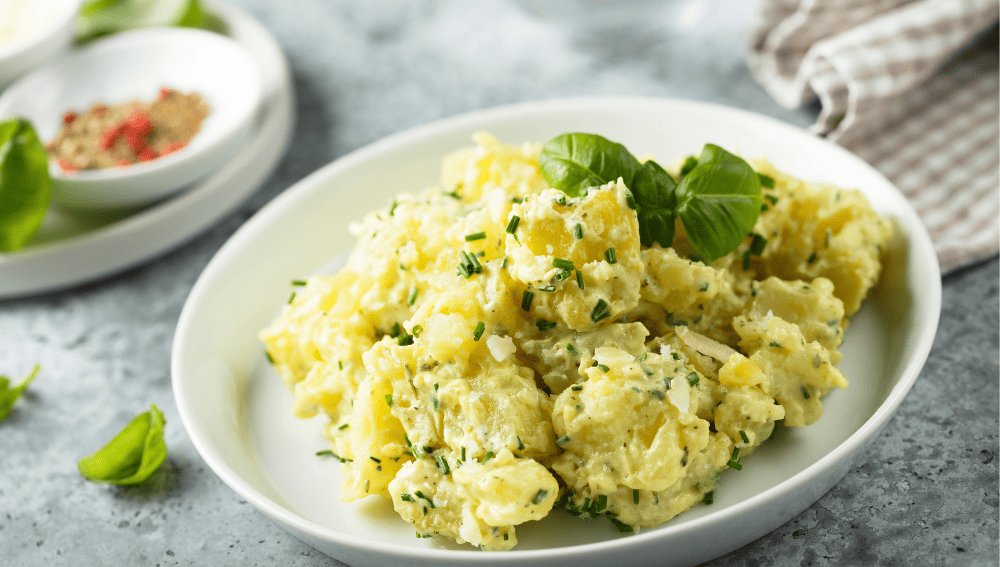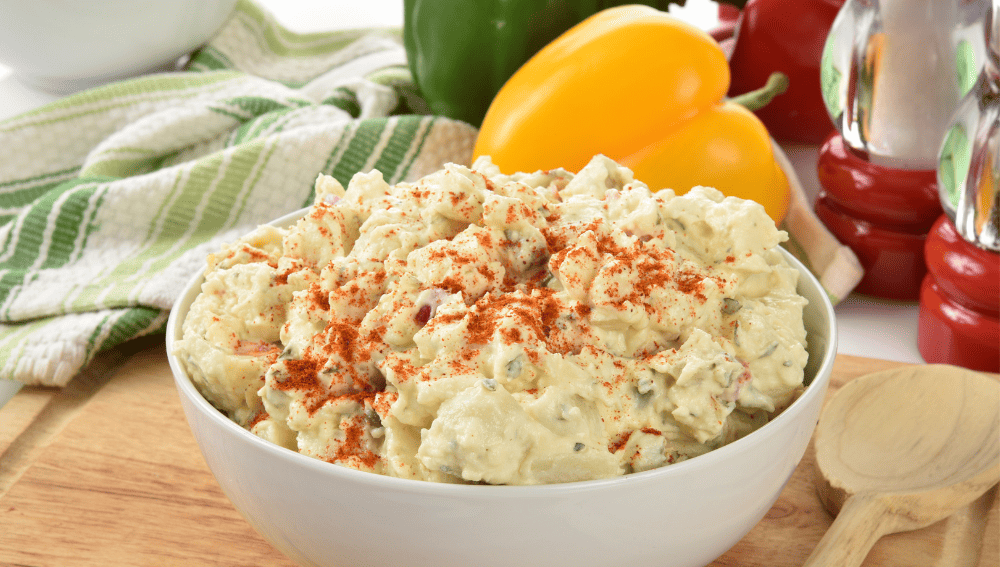Potato salad is a popular dish that is often served at picnics, barbecues, and other outdoor events. However, for pregnant women, consuming certain foods can be a cause for concern.
This leads many expecting mothers to question whether or not it is safe to eat potato salad during pregnancy.
Understanding Pregnancy Nutrition Pregnancy is a time when proper nutrition is crucial for the health and well-being of both the mother and the developing fetus. A balanced diet that includes a variety of fruits, vegetables, whole grains, lean proteins, and healthy fats is recommended.
However, certain foods should be avoided or limited due to the risk of foodborne illness or other health concerns. Potato salad is one such food that falls into this category.
Key Takeaways
- Proper nutrition is crucial during pregnancy for the health of the mother and developing fetus.
- Potato salad should be avoided or limited during pregnancy due to the risk of foodborne illness and other health concerns.
- Pregnant women can safely consume alternative dishes or homemade potato salad made with safe preparation methods.
Understanding Pregnancy Nutrition
Pregnancy is a time when a woman’s body undergoes significant changes, and proper nutrition is essential for the healthy growth and development of the fetus. A balanced diet that includes all the necessary nutrients is crucial for the mother and the baby’s health.
Vitamins and minerals play a vital role in maintaining a healthy pregnancy. Pregnant women require more of certain vitamins, such as folic acid, which helps prevent congenital disabilities. Iron is also essential as it helps in the formation of red blood cells, which carry oxygen to the baby.
Protein is another essential nutrient during pregnancy, as it helps in the growth and development of the baby’s tissues and organs. Additionally, dietary fiber is crucial for maintaining regular bowel movements and preventing constipation, which is a common issue during pregnancy.
Energy needs also increase during pregnancy, and it is recommended that pregnant women consume an additional 300-500 calories per day. However, it is essential to monitor blood glucose levels, especially in women with gestational diabetes, to prevent complications such as hypertension and preeclampsia.
In conclusion, a balanced diet with adequate amounts of protein, iron, vitamins, and minerals, including dietary fiber, is essential during pregnancy.
It is recommended that pregnant women consult with their healthcare provider to ensure they are meeting their nutritional needs and to address any concerns.
Potato Salad and Its Ingredients
Potato salad is a popular dish that is enjoyed by many people. It is often served at picnics, barbecues, and other outdoor events. Potato salad can be made in many different ways, but it typically includes potatoes, eggs, mayonnaise, and various vegetables.
The main ingredient in potato salad is, of course, the potato. Potatoes are a good source of carbohydrates and fiber, and they are also rich in vitamin C, potassium, and other nutrients. When making potato salad, it is important to choose the right type of potato.
Waxy potatoes, such as red potatoes or fingerling potatoes, are best for potato salad because they hold their shape well and don’t become mushy.
Eggs are another important ingredient in potato salad. They provide protein and add richness to the dish. When making potato salad, it is important to cook the eggs properly.
Hard-boiled eggs are typically used in potato salad, and they should be cooked until the yolks are firm and fully cooked.
Mayonnaise is a common ingredient in potato salad, and it provides a creamy texture and tangy flavor. However, it is important to use mayonnaise in moderation, as it is high in calories and fat.
Some recipes call for a combination of mayonnaise and sour cream or yogurt, which can help to reduce the overall fat content of the dish.
Vegetables such as onions, celery, and bell peppers are often added to potato salad for flavor and texture. Herbs such as parsley or chives can also be added for additional flavor. Salt, pepper, vinegar, and sugar are used to season the dish and balance the flavors.
Overall, potato salad can be a healthy and delicious dish when made with the right ingredients and in moderation. It is important to choose fresh, high-quality ingredients and to use mayonnaise and other high-fat ingredients in moderation.
Health Concerns with Potato Salad
Potato salad is a popular dish that can be found at many gatherings and events. However, there are some health concerns associated with consuming potato salad, especially for pregnant women.
One of the main concerns is the risk of contracting a foodborne illness. Potato salad can be a breeding ground for harmful bacteria such as listeria, salmonella, and staphylococcus aureus.
These bacteria can cause food poisoning, which can lead to serious health complications for both the mother and the unborn child.
Listeria infection, in particular, is a major concern for pregnant women. This type of bacteria can cause miscarriage, stillbirth, and other serious health problems for the baby.
It is important for pregnant women to avoid foods that are more likely to contain listeria, including potato salad that has been sitting out at room temperature for an extended period of time.
To reduce the risk of foodborne illness, pregnant women should ensure that the potato salad they consume is prepared and stored properly.
This includes keeping it refrigerated until it is ready to be served, avoiding cross-contamination with other foods, and ensuring that all ingredients are fresh and properly cooked.
In summary, while potato salad can be a tasty addition to any meal, pregnant women should be cautious when consuming it due to the risks of foodborne illness.
By following proper food safety guidelines, pregnant women can enjoy potato salad without putting their health or the health of their unborn child at risk.
Homemade vs Restaurant Potato Salad
When it comes to potato salad, there are two main options: homemade or restaurant-made. Both have their pros and cons, and pregnant women should be aware of the potential risks associated with each.
Homemade Potato Salad
Homemade potato salad is made in the comfort of one’s own kitchen, which means the cook has control over the ingredients and the preparation process. This can be reassuring for pregnant women who want to ensure that the food they eat is safe and healthy for their growing baby.
However, there are still risks associated with homemade potato salad. If not stored properly in the refrigerator, the potato salad can become a breeding ground for bacterial contamination.
Pregnant women should always make sure that the potato salad is kept at a safe temperature and consumed within a few days of being made.
Restaurant Potato Salad
Restaurant potato salad can be found at salad bars, delis, and fast-food establishments like KFC. While it can be convenient to grab a container of potato salad on the go, there are some potential risks associated with restaurant-made potato salad.
The main risk is bacterial contamination. Restaurants may not always follow proper food safety protocols, and the potato salad may be left out at room temperature for too long, allowing bacteria to grow.
Additionally, the ingredients used in restaurant potato salad may not be as fresh or high-quality as those used in homemade potato salad.
In conclusion, pregnant women should be cautious when consuming potato salad, whether it’s homemade or restaurant-made. It’s important to ensure that the potato salad is stored properly and consumed within a few days of being made.
When eating at a restaurant, it’s best to choose a reputable establishment that follows proper food safety protocols.
Safe Preparation and Consumption
When it comes to eating potato salad during pregnancy, safe preparation and consumption are crucial to avoid any potential risks to the health of the mother and the baby.
It is important to keep in mind that pregnant women are more susceptible to foodborne illnesses, which can be harmful to the developing fetus.
One of the key factors in safe potato salad consumption is ensuring that all ingredients are properly washed and cooked.
It is recommended to use pasteurized eggs in the recipe, which reduces the risk of salmonella infection. Additionally, it is important to use fresh and high-quality ingredients, and to avoid any expired or spoiled products.
Another important aspect of safe potato salad consumption is proper refrigeration. The salad should be kept at a temperature below 40°F (4°C) to prevent the growth of harmful bacteria.
If the potato salad has been sitting at room temperature for more than two hours, it should be discarded to avoid the risk of foodborne illness.
When preparing potato salad, it is recommended to use a clean cutting board and utensils to avoid cross-contamination. It is also important to wash hands thoroughly before and after handling food.
In summary, pregnant women can safely consume potato salad as long as it is prepared and stored properly. Using pasteurized eggs, washing and cooking ingredients thoroughly, and refrigerating the salad at the appropriate temperature are key factors in ensuring safe consumption.
Possible Substitutes and Alternatives
There are several alternatives to potato salad that pregnant women can consider. These options can provide similar flavors and textures without the risk of foodborne illness.
Coleslaw
Coleslaw is a popular side dish that can be a great substitute for potato salad. It is made with shredded cabbage and carrots and can be dressed with a variety of sauces, such as mayonnaise or vinaigrette.
Pregnant women should choose coleslaw made with pasteurized mayonnaise or homemade coleslaw to avoid the risk of listeria.
Salmon or Trout Salad
Salmon or trout salad can be a healthy and tasty alternative to potato salad. These fish are rich in omega-3 fatty acids, which are important for fetal brain development.
Pregnant women should choose cooked salmon or trout and avoid raw or smoked fish to reduce the risk of foodborne illness.
Soft Cheeses
Soft cheeses, such as feta or goat cheese, can be a delicious addition to salads. Pregnant women should choose pasteurized soft cheeses to avoid the risk of listeria. Soft cheeses made with unpasteurized milk can contain harmful bacteria that can cause foodborne illness.
Overall, pregnant women can enjoy a variety of alternatives to potato salad that are both delicious and safe to eat.
By choosing pasteurized or cooked ingredients and avoiding raw or smoked foods, pregnant women can reduce the risk of foodborne illness and enjoy a healthy and satisfying meal.
Conclusion
In conclusion, pregnant women can eat potato salad, but there are certain precautions that should be taken. It is important to ensure that the potato salad is made fresh and stored at the correct temperature to avoid any risk of foodborne illness.
When it comes to the ingredients in potato salad, pregnant women should be cautious of certain items such as raw eggs and deli meats. It is recommended to use pasteurized eggs and avoid deli meats unless they are heated to steaming hot before consuming.
Overall, pregnant women should listen to their bodies and consult with their healthcare provider if they have any concerns about consuming potato salad or any other food during pregnancy.
By following these guidelines, pregnant women can safely enjoy potato salad as part of a healthy and balanced diet.
Read some related posts:
Frequently Asked Questions
What are some foods to avoid during pregnancy?
Pregnant women should avoid certain foods that may contain harmful bacteria or toxins, such as raw or undercooked meat, fish with high levels of mercury, unpasteurized dairy products, and deli meats. It is also recommended to limit caffeine and avoid alcohol.
Can pregnant women eat macaroni salad?
Macaroni salad should be avoided during pregnancy because it often contains mayonnaise, which can be made with raw eggs. Raw eggs may contain harmful bacteria such as Salmonella, which can cause foodborne illness.
Is it safe for pregnant women to eat Tesco coleslaw?
Tesco coleslaw and other store-bought coleslaw should be avoided during pregnancy because they may contain unpasteurized dairy products or mayonnaise made with raw eggs, which can be harmful to the developing fetus.
What happens if a pregnant woman eats coleslaw?
If a pregnant woman eats coleslaw that contains harmful bacteria or toxins, it can cause foodborne illness or other complications during pregnancy. It is important for pregnant women to avoid foods that may be unsafe for consumption.
Can pregnant women eat KFC coleslaw?
KFC coleslaw should be avoided during pregnancy because it may contain unpasteurized dairy products or mayonnaise made with raw eggs, which can be harmful to the developing fetus.
Is potato salad safe for pregnant women to eat?
Potato salad can be safe for pregnant women to eat if it is made with pasteurized dairy products and cooked potatoes. However, pregnant women should avoid potato salad that contains mayonnaise made with raw eggs, which can be harmful to the developing fetus.

Iesha is a loving mother of 2 beautiful children. She’s an active parent who enjoys indoor and outdoor adventures with her family. Her mission is to share practical and realistic parenting advice to help the parenting community becoming stronger.



